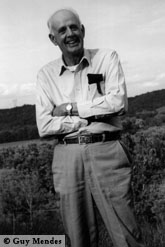Wendell Berry occupies a unique place in American literary culture. Born in Kentucky in 1934, he has stayed close to his roots in caring for the land that his ancestors settled almost 200 years ago. One of our preeminent philosophers of place, a leading advocate for environmental stewardship, and a fierce critic of agribusiness, he first came to literary notice as a poet in the 1960s. Since then, Berry has written numerous books of poetry, nonfiction works, and novels.
Sustainability is the thread running through all of his literary works. Berry articulates a persistent criticism of industrial agriculture, with its reliance on fossil fuels, mono-cultural techniques, and a studied ignorance of the local context in its drive for efficiency and profits. Using views derived from his own Christian religious heritage as well as teachings from Native American traditions and Eastern thought, Berry voices the imperative of caring for all of creation, rejecting the dominant Western ideology that the Earth belongs to humans. Rather, in his view, humans belong to the Earth, one among co-equals to other forms of life.
Berry started an academic career in the 1950s, earning a BA in 1956 at the University of Kentucky and an MA the following year. He studied and taught in Stanford University's creative writing program. Receiving a Guggenheim Fellowship in 1961-62, he subsequently taught at New York University until 1964. He returned to the University of Kentucky, where he served as a distinguished professor of English. He has left academic life for periods, farming and writing full-time.
Starting with thoughtful poems about humans in relation with other humans and with the natural world, Berry found his metier as a critic of cultural attitudes and social behavior that has contributed to the degradation and the devaluation of the very ecological systems that human life depends upon. As the American environmental movement has metamorphized into the global drive to achieve sustainability, he has been a steady voice of reason and compassion. Few public intellectuals have spanned the time since Rachel Carson's 1962 indictment of the excesses of the chemical industry in Silent Spring to the present dark prognosis of radical climate change with such enduring vitality.
His book, The Unsettling of America (Sierra Club Books 1977), brought his views to a wide reading public. Combining history, a keen observer's eye, and moral suasion, Berry dissects the American body politic--its technophilia, its reliance on specialized knowledge, and its alienation from the land--and offers not just a scathing critique but also healing prescriptions. His most recent collection, Bringing It to the Table:On Farming and Food (Counterpoint 2009), brings his wisdom to bear on a perennial issue made newly relevant by rising public awareness of the relationship between environmental well-being and human health.
Berry is the recipient of many honors, most recently the Louis Broomfield Society award for the support of sustainable agriculture and the Cleanth Brooks Medal for Lifetime Achievement, both in 2009.


